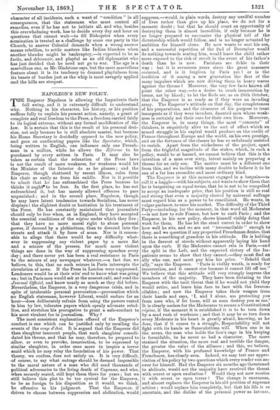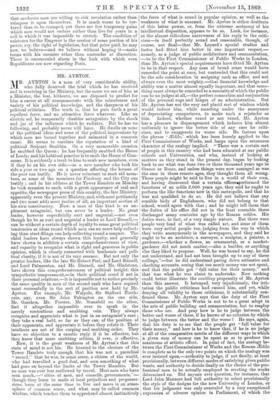NAPOLEON'S NEW POLICY.
THE Emperor Napoleon is allowing the Impatients their full swing, and it is extremely difficult to understand why. Nothing in his character, his history, or his position 'suffices fully to explain his present action, namely, a grant of :complete and real freedom to the Press, a freedom carried fairly to its logical extreme, without any formal modification of the law. It is certain that this is the result of his personal deci- sion, not only because he is still absolute master, but because his Home Secretary is decidedly opposed to the new policy, and goes ou confiscating papers like the Spectator, which, being written in English, can influence only one French- man in a million, while he allows the Reforme to be purchased by every artisan in Paris. It may also be taken as certain that the relaxation of the Press laws is not the result of mere weakness, for weakness would let the Minister of the Interior do as he pleases ; and the Emperor, though shattered by recent illness, rules from his chair as easily as from his saddle. Nor is it possible to admit that he has enfranchised the Press because he thinks it ought to be free. In the first place, he has not enfranchised it, but has merely allowed offences to pass unpunished ; and in the second place, Napoleon, though he may have latent tendencies towards Socialism, has never displaye I the slightest doubt or hesitation in his treatment of the Press. He has constantly maintained that journalists :should only be free when, as in England, they have accepted the essential conditions of the regime under which they live ; that they have no more moral right to abuse personal power, if decreed by a plebiscitum, than to descend into the streets and attack it by force of arms. Nor is it reason- able to allege that there would be any difficulty what- ever in suppressing any violent paper by a mere fiat and a seizure of the presses, for much more violent things are done in the way of suppressing speeches every 'day; and there never yet has been a real resistance in Paris to the seizure of any newspaper whatever,—a fact due, we believe, to this, that no such seizure in Paris interrupts the circulation of news. If the Press in London were suppressed, Londoners would be at their wits' end to know what was going on; but in Paris men would ask at the nearest cafe, and read the Journal Offtciel, and know nearly as much as they did before. Nevertheless, the Emperor, in a very dangerous crisis, and in spite of intolerable personal provocation—provocation which no English statesman, however Liberal, would endure for an hour—does deliberately refrain from using the powers vested in him by law, tolerates papers which openly advocate rebel- lion, and stretches his prerogative to grant a safe-conduct to his most virulent foe in journalism. Why ? The most consistent explanation offered of the Emperor's conduct is one which can be justified only by recalling the events of the coup d'e'tat. It is argued that the Emperor did then slaughter innocent people, that such slaughter consoli- dated his throne, and that he may, therefore, be prepared to allow, or even to provoke, insurrection, to be repressed by :Similar slaughter, in order once more to inspire a terror amid which he may relay the foundation of his power. That theory, we confess, does not satisfy us. It is very difficult, :of course, to say what outrage should be deemed impossible to the moral nature of a man who did send thousands of political adversaries to the living death of Cayenne, and who, when securely seated, still kept them there for years ; but we 'still believe this plot to be too cynical for the Emperor, 'to be as foreign to his disposition as it would, we think, be offensive to his judgment. That the Empel or, if driven to choose between suppression and abdication, would suppress,—would, in plain words, destroy any needful number of lives rather than give up his place, we do not for a moment doubt ; but that he should court an opportunity of destroying them is almost incredible, if only because he i8 no longer prepared to encounter the physical toil of the dictatorship which would follow, and is no longer actuated by ambition for himself alone. He now wants to seat his son, and a successful repetition of the 2nd of December would do nothing towards seating him, would leave the child rather more exposed to the risk of revolt in the event of his father's death than he is now. Parisians are fickle in their way ; but it is seventeen years since the great massacre occurred, and is it forgiven by Paris yet ? or is the tradition of it among a new generation the first of the many impulses which are now driving them in heavy waves against the throne ? Moreover, the very few facts known all point the other way,—to a desire to crush insurrection by terror, not by blood ; to let the Reds see, as on 26th October, that the Emperor is as ready as if they were an invading army. The Emperor's attitude on that day, the completeness of his preparations, and the clearness of his purpose to treat insurgents as if they were invaders, daunted men whose weak- ness is certainly not their care for their own lives. Moreover, the Emperor is, in many things, the most "concrete" of thinkers, is exquisitely alive to the sort of effect which an armed struggle in his capital would produce on the credit of France throughout Europe and the world, on his own prestige, and on the fortunes of the classes he has so sedulously assisted to enrich. Apart from the wickedness of the project, apart from the frightful magnitude of the stakes, which, in such a policy, would be at hazard, we cannot believe that this is the intention of a man over sixty, intent mainly on preparing a throne for an only son. The motive must be a different one from this, and we incline with many doubts to believe it to be one of a far less recondite and more ordinary kind.
The Emperor is at this moment engaged in a bargain—ok call it a haggle—with his subjects, and wants to show them that he is bargaining on equal terms, that he is not to be compelled to accept an inadequate price, that his position is still so real and strong that even a majority elected by universal suffrage must regard him as a power to be conciliated. He wants, in vulgar parlance, to raise his market. The difficulty of the Third Party—including, for the moment, in that word all Moderates —is not how to rule France, but how to curb Paris ; and the Emperor, in his new policy, shows himself visibly doing that work for them. He has let the steed curvet in order to show how well he sits, and we are not " irreconcilable " enough to deny, and we question if any propertied Frenchman denies, that there is something of grandeur in his attitude. He is holding in the fiercest of steeds without apparently laying his hand upon the curb. If the Moderates cannot rein in Paris,—and the split in the Left, and the expected victory of the Im- patients seems to show that they cannot,—they must find an ally who can, and must pay him his price. "Behold that ally," says the Emperor. "Paris is visibly wroth, is ready for insurrection, and it cannot rise because it cannot lift off me." We believe that this attitude will very strongly impress the members of the majority. They have been dictating to the Emperor with the tacit threat that if he would not yield they would retire, and leave him face to face with the Irrecon- cilables ; and now the Emperor takes their weapon from their hands and says, I, and I alone, am protecting you from men who, if let loose, will as soon destroy you as me.' It is clearly useless for the Moderates to secure a Constitutional r'egime, if the moment it is established it is to be torn down by a mad rush of workmen ; and that it may be so torn down every Moderate in his heart is greatly afraid, knowing, as he does, that if it comes to a struggle, Respectability will not fight with its hands as Sansculottism will. When one is in the arena, the man who holds the lion's cage in his keeping is formidable, be he never so bad a character. The more strained the situation, the more real and terrible the danger, the greater the valua of the alliance ; and this, we believe, the Emperor, with his profound knowledge of France and Frenchmen, has clearly seen. Indeed, we may test our appre- ciation of his policy by two questions which every reader can an- swer for himself. Had the Emperor six months ago threatened to abdicate, would not the majority have received the threat with secret or open exultation ? Would they not now receive it with secret or open terror ? The change is enormous, and almost replaces the Emperor in his old position of supreme arbiter ; would replace him completely, but that his life is so uncertain, and the dislike of the personal power so intense,
that moderate men are willing to risk revolution rather than reimpose it upon themselves. It is much worse to be tor- tured than to be cramped, yet there are few temporary pains which men would not endure rather than live for years in a cell in which it was impossible to stretch. The condition of existence for the Emperor is the cession of some portion of his power, say, the right of legislation, but that price paid, he may now, we believe—and we believe without hoping it—make terms with his enemies other than surrender at discretion. There is unconcealed alarm in the look with which even Republicans are now regarding Paris.



































 Previous page
Previous page